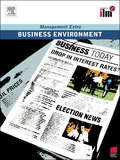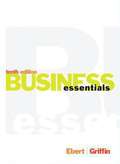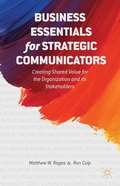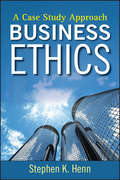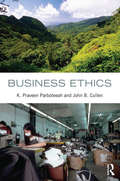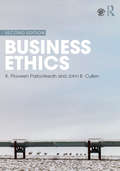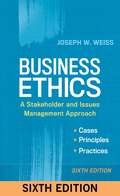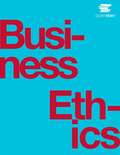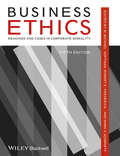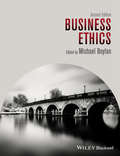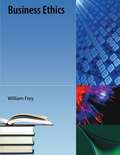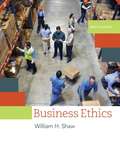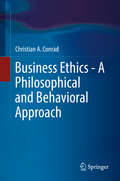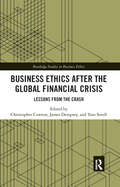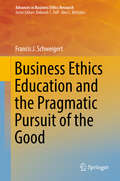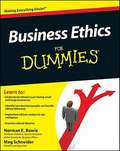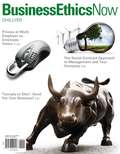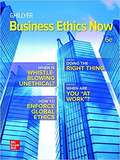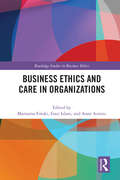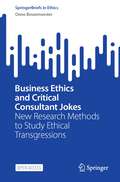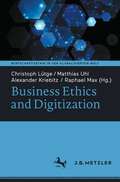- Table View
- List View
Business Environment (Revised Edition)
by ElearnStuck for ideas, inspiration or just want to work differently? Management Extra brings all the best management thinking together in one package. The books are practical and well structured to provide an in depth treatment of these management topics. Titles in the series: * Business Environment * Change Management * Development for High Performance * Effective Communications * Financial Management * Information and Knowledge Management * Leadership and Management in Organisations * Leading Teams * Making Sense of Data and Information * Managing Markets and Customers * Managing for Results * Managing Health, Safety and Working Environment * Managing Legal and Ethical Principles * Managing Yourself * Positive Working Relationships * Project Management * Quality and Operations Management * Reaching Your Goals Through Innovation * Recruitment and Selection * Reputation Management The series fuses key theories and concepts with applied activities to help managers examine how they work in practice. The books are created with individuals in mind. They are designed to help you improve your management skills. Management Extra can also be used in conjunction with management programmes of study aligned to standards. Each of the books has case studies, self assessments and activities all underpinned by knowledge and understanding of the frameworks and techniques required to improve performance. Management Extra provides managers and trainers with a handbook for action and development. "You found it – what a find! A practical resource packed with all the relevant theory and suggested activities to support your professional development. An essential resource to have at your fingertips, jump in and enjoy."--Russell Jeans, Learning and Development Manager, ntl "All the essential concepts are here, presented in an easily digestible format with lots of up to date case studies and references – but, most importantly, with plenty of thought provoking activities and self-diagnostic exercises to make the learning personal and transferable."--Peter Manning, Head of Training & Development, News International Newspapers Ltd
Business Essentials
by Ricky W. Griffin Ronald J. EbertThis book is for introductory business courses. Focus on the practical skills and important developments in business. <p><p> The recent events in domestic and global economies are presenting unprecedented challenges, excitement, and disappointments for businesses -- and a need for change in introduction to business courses and texts. This book captures the widespread significance of these developments and presents their implications on companies today. <p><p> The 12th Edition includes new real-world examples and research findings, helping students to see how entrepreneurs are putting into practice the concepts that they are learning about, and making this text the most current and relevant one available on the market.
Business Essentials (Eighth Edition)
by Ricky W. Griffin Ronald J. EbertBusiness Essentials continues to provide a solid foundation of the essential topics that first-semester business students need to understand. Its focus on practical skills, knowledge of the basics, and important developments in business makes for a brief book, but a rich experience. <p><p> The recent events in domestic and global economies are presenting unprecedented challenges, excitement, and disappointments for business–and a need for a change in the Introduction to Business course and text. The eighth edition captures the widespread significance of these developments and presents their implications on businesses today.
Business Essentials (Tenth Edition)
by Ricky Griffin Ronald J. EbertBusiness Essentials continues to provide a solid foundation of the essential topics in business. Its focus on practical skills, knowledge of the basics, and important developments in business makes for a brief book, but a rich experience. The recent events in domestic and global economies are presenting unprecedented challenges, excitement, and disappointments for business--and a need for a change in the Introduction to Business course and text. This text captures the widespread significance of these developments and presents their implications on businesses tod
Business Essentials for Strategic Communicators
by Matthew W. Ragas Ron CulpThe rise of digital media and the public's demand for transparency has elevated the importance of communication for every business. To have a voice or seat at the table and maximize their full value, a strategic communicator must be able to speak the language and understand business goals, issues, and trends. The challenge is that many communicators don't hold an MBA and didn't study business in college. Business Essentials for Strategic Communicators provides communication professionals and students with the essential "Business 101" knowledge they need to navigate the business world with the best of them. Readers will learn the essentials of financial statements and terminology, the stock market, public companies, and more all with an eye on how this knowledge helps them do their jobs better as communication professionals. "
Business Essentials for Utility Engineers
by Richard E. BrownIt is no longer acceptable for utility engineers to make spending decisions solely because they make good engineering sense. In today’s environment, they must also demonstrate solid business acumen and show that recommendations make good business sense. With this goal in mind, Business Essentials for Utility Engineers systematically presents each business topic to arm engineers with the tools and vocabulary necessary to be more effective when interacting with senior management, and for promotion to senior management. This book covers all business concepts important to utility engineers, including regulation, ratemaking, accounting, finance, risk management, economics, budgeting, and asset management. The author applies his vast corporate experience to give readers a solid foundation for business theory, discussing the idiosyncrasies of utilities and using advanced mathematics to demonstrate business concepts. He also explains how to properly apply this theory to utilities, expounding on specific business skills that will greatly benefit utility engineers in their daily jobs. Chapters are organized to build sequentially upon each other, and take advantage of the mathematical sophistication and deductive nature of engineers when presenting material. After reading this book, utility engineers will view their industry from a new perspective, and will have a greatly expanded business vocabulary. Suitable for self-study, undergraduate study, graduate study, or as a desk reference, this book provides a robust framework for correct business thinking and a solid foundation for further learning. WAtch Richard E. Brown talk about his book at: http://youtu.be/gdyjq77nQFI
Business Ethics
by Gael McdonaldThis e-book brings together six papers around the topic of business ethics. In addition to examining the contrasting dimensions of ethical absolutism and ethical relativism which is most relevant in international business it is hoped that from this work further attention is given to the discussion of durability of ethical values and principles in business practices in the domestic marketplace, and in society at large.
Business Ethics
by Henn Stephen K.There's a "new normal" in business ethics Despite all the words and regulations aimed at building ethical and responsible organizations, observed misbehavior has increased-think of the Siemens scandal and Bernie Madoff. Business Ethics: A Case Study Approach confronts the brutal fact about business ethics as it exists today-it's not working. This stirring casebook powerfully draws a direct line between ethics and business performance-that is, the sounder your company's ethical foundation, the stronger it will perform in brand recognition, sales, customer satisfaction and loyalty, employee productivity, and even in reduced regulatory burdens. So, how can you develop leadership that sets the right tone at the top? Author and ethics professional Stephen Henn answers that question with candidly insightful case studies that look at every angle of ethical lapses, including: A CFO's Dilemma The Duke University Lacrosse Scandal Arthur Andersen The Stanford Prison Experiment The Smithsonian Institution Firestone/Ford Tire Recalls Jordan's Furniture Whirlpool and Leadership Development Ponzi Schemes And many more Examining the old mind-sets and dogmas on business ethics and holding them up to the light of day, Business Ethics: A Case Study Approach reveals how the ethical health of your organization will forecast whether or not it outperforms the competition. This is your twenty-first-century rule book for understanding the "new normal" in business ethics.
Business Ethics
by John B. Cullen K. Praveen ParboteeahBusiness Ethics provides a thorough review and analysis of business ethics issues using several learning tools: Strategic Stakeholder Management as the Theme: All chapters use a strategic stakeholder approach as a unifying theme. The text is thus the first text that adopts this approach. Most business ethics scholars and practitioners agree that successful ethical companies are the ones that can strategically balance the needs of their various stakeholders. By adopting this approach, students will be able to see how the various aspects of business ethics are connected. Theory-based and Application-based: All chapters have important applicable theories integrated with discussion of how such theories apply in practice. Unlike other texts that are either too theoretical or too practical, this text provides the appropriate blend of theory and practice to provide deeper insights into the concepts covered in the chapter. Global Perspective: Unless most other texts, this text provides a global perspective on business ethics. Most chapters include material pertaining to ethics in global contexts. Included are cases about companies in a wide range of countries including Japan, U.K., China and India among many others. Cases: The text contains over 30 real world global cases. Each chapter ends with a short two page case as well as a longer case that varies in length. Each has discussions questions at the end. Finally each of the four parts ends with a Comprehensive Case; proven teaching cases from The Ivey School and other sources.
Business Ethics
by John B. Cullen K. Praveen ParboteeahA foundational text for the modern business student and an essential instructor resource, this book presents a thorough and comprehensive introduction to business ethics. Taking a strategic stakeholder approach—one that emphasizes how important it is to balance multiple stakeholders’ needs—students will develop the critical skills they need to analyze and solve complex ethical issues, while ensuring overall business success. The second edition retains Business Ethics’ strong balance of theory and practice, but incorporates several new features, including: Fresh cases ensuring students are exposed to the most topical real-world examples A global view, with examples from international and emerging markets, and coverage of ethical standards from around the world An expanded chapter on individual ethical decision-making, as well as a new chapter devoted to ethical theory A renewed emphasis on the popular boxed features with more integration of newer case studies, and the addition of "Emerging Market Business Ethics Insights" The latest data on business ethics and ethics related issues from a variety of reputable sources A comprehensive set of lecture slides, test questions, and instructor notes provide additional material for the classroom.
Business Ethics
by Joseph W. WeissEthics for Today This is a pragmatic, hands-on, up-to-date guide to determining right and wrong in the business world. Joseph Weiss integrates a stakeholder perspective with an issues-oriented approach so students look at how a business's actions affect not just share price and profit but the well-being of employees, customers, suppliers, the local community, the larger society, other nations, and the environment. Weiss uses a wealth of contemporary examples, including twenty-three customized cases that immerse students directly in recent business ethics dilemmas and ask them to consider how they would resolve them. The recent economic collapse raised ethical issues that have yet to be resolved--there could not be a better time for a fully updated edition of Weiss's classic, accessible blend of theory and practice. New to the Sixth Edition! New Cases! Fourteen of the twenty-three cases in this book are brand new to this edition. They touch on issues such as cyberbullying, fracking, neuromarketing, and for-profit education and involve institutions like Goldman Sachs, Google, Kaiser Permanente, Walmart, Ford, and Facebook. Updated Throughout! The text has been updated with the latest research, including new national ethics survey data, perspectives on generational differences, and global and international issues. Each chapter includes recent business press stories touching on ethical issues. New Feature! Several chapters now feature a unique Point/Counterpoint exercise that challenges students to argue both sides of a contemporary issue, such as too-big-to-fail institutions, the Boston bomber Rolling Stone cover, student loan debt, online file sharing, and questions raised by social media.
Business Ethics
by Stephen M. Byars Kurt StanberryBusiness Ethics is designed to meet the scope and sequence requirements of the single-semester business ethics course. This title includes innovative features designed to enhance student learning, including case studies, application scenarios, and links to video interviews with executives, all of which help instill in students a sense of ethical awareness and responsibility.
Business Ethics
by W. Michael Hoffman Robert E. Frederick Mark S. SchwartzThe fifth edition of Business Ethics addresses current, intriguing, often complex issues in corporate morality through 53 readings and 30 pertinent case studies. Now significantly updated, it includes new leading articles, related current cases, and mini-cases based on MBA student dilemmas.Addresses a broad range of the most current, intriguing, often complex issues and cases in corporate moralityProvides impartial, point-counterpoint presentations of different perspectives on the most important and highly contended issues of business ethicsUpdated and significant case studies are included to reinforce student learningNow contains mini-cases based on actual MBA student dilemmasEach author has substantial experience in teaching, writing, and conducting research in the field
Business Ethics
by Michael BoylanThe second edition of Business Ethics introduces readers to key ethical issues that arise within the world of business, providing a strong theoretical foundation as well as real world applications. This new edition has been greatly revised, and includes new sections on the financial services industry, globalization, and global economic justice.An accessible introduction for beginners, offering a combination of important established essays and new essays commissioned especially for this volumeGreatly revised - more than half of the selections are new to this edition. Newly commissioned essays address information technology, global economic justice and globalization, stakeholder theory, the corporation as an individual, and other topicsUses diverse, authentic business cases to illustrate discussion of conceptsCases have been updated to reflect current problems and issuesProvides students with guidance and tools to write their own case study essaysReadings are presented to progressively develop the reader's ability to read and apply ethical theory by writing case responses from different vantage points
Business Ethics
by William FreyBusiness Ethics is a derived copy from the Corporate Governance course previously published in Connexions. While many courses using this title place emphasis on applying classical philosophical and ethical theory, this course's approach is decidedly interdisciplinary and practical. It is not designed as a socio-humanistic elective, a service philosophy course, or even an applied philosophical ethics course but as a laboratory, skills-based course where students develop, practice, and refine decision-making and problem-solving strategies that they will carry with them into the world of business practice. Emphasis has been placed on responding to the four ethical themes identified by the AACSB ethics task force: Ethical Leadership, Ethical Decision-Making, Social Responsibility, and Corporate Governance. Modules include (1) theory building activities (responsibility, rights, virtue), (2) problem specification frameworks emphasizing socio-technical system building and analogies with design, (3) specific modules responding to AACSB ethics themes (moral ecologies, corporate social responsibility, corporate governance, and a history of the modern corporation) and (4) modules that provide the course with a capstone, integrative experience (Business Ethics Bowl, Social Impact Statement Reports, and Corporate Ethics Compliance Officer Reports). While a quick glance shows that this collection holds more modules than can possibly be covered in a single semester, this approach gives the user flexibility as to the method used for integrating ethics into the business administration curriculum. Modules can be recombined into different standalone courses such as business ethics, business/government/society, or environment of organizations. Since each module can be covered independently, they can be integrated into the business administration curriculum as specific interventions in mainstream business courses in areas like accounting, finance, management, information systems, human resources or office administration. (In fact many have been written for and tested in these circumstances.) Business Ethics has been developed through the NSF-funded project, "Collaborative Development of Ethics Across the Curriculum Resources and Sharing of Best Practices," NSF SES 0551779.
Business Ethics
by William H. ShawBusiness Ethics, Ninth Edition is a comprehensive and practical guide that will help you with real life ethical issues that rise in the business world. It will assist you through the process of developing the critical thinking and analytical skills needed to successfully navigate the unique set of problems that emerge when ethics and commerce collide. This book focuses on key ethical concepts and emphasizes the real world importance of critical topics such as the nature of morality, major theories of ethics and economic justice, and competing views of capitalism and corporate responsibility. It is thorough, flexible, and designed to bolster student involvement with the material for better comprehension and understanding.
Business Ethics - A Philosophical and Behavioral Approach
by Christian A. Conrad Danica WebbThis textbook examines the extent to which moral values play a role as productive forces for the economy, and explores the effect of ethical and unethical Behavior on the economy. It shows how ethics improves productivity in the economy, and provides specific ethics tools for practical application for students and managers. Stemming from an overall interdisciplinary approach, and combining recent research results from sciences such as economics, business administration, Behavioral economics, philosophy, psychology and sociology, this textbook fills a gap in the literature on ethics in business. The book begins with the foundations of business ethics by defining business ethics, delineating its objectives, and discussing the importance of business ethics for business, the economy and society. Next, it presents the ethical evaluation approaches to enable the reader to evaluate economic Behavior ethically. It then explores ‘man in business’, and deals with such issues as Behavior, motivation, ethical orientation, and the presence or absence of a sense of justice. Following this is a discussion of the rules of the market and of questions such as: Does the market economy promote ethical Behavior or is there a conflict of goals between ethics and market economy? Do companies have a social responsibility? The book concludes with an analysis of the importance of ethics for productivity in the enterprise and in the economy, and presents ethics tools as the instruments with which management can promote ethical Behavior of their employees. Following a textbook structure, the book first derives knowledge from scientific studies that is relevant for students, and then summarizes the results. It explains ethical assessment approaches, and then gives an ethical assessment of economic Behavior using case studies. It uses roleplaying and games to explain the Behavior of people in relation to ethics.
Business Ethics After the Global Financial Crisis: Lessons from The Crash (Routledge Studies in Business Ethics)
by Tom Sorell Christopher Cowton James DempseyThe global financial crisis (GFC) that began in 2007 concentrated attention on the morality of banking and financial activities. Just as mainstream businesses became increasingly defined by their financial performance, banks, it seemed, got themselves – and everyone else – into trouble through an over-emphasis on themselves as commercial enterprises that need pay little attention to traditional banking virtues or ethics. While the GFC had many causes, criticism was legitimately levelled at banks over the ethics of mortgage creation, excessive securitisation, executive remuneration, and high-pressure customer sales tactics, amongst other things. These criticisms mirror those that have been levelled at the business more generally, particular in the last decade, although the backdrop provided by the GFC is more dramatic, and the outcomes of supposed wrongdoing more severe. This book focuses on business ethics after the GFC; not on the crisis itself, but how we should respond to it. The GFC has focused minds on the proper role of ethics in the understanding and conduct of business activity, but it is essential to look beyond the crisis to address the deeper challenges that it highlights. The aim of this volume is to present examples of the latest philosophically-informed thinking across a range of ethical issues that relate to business activity, using the banks and the GFC – the consequences of which continue to reverberate – as a point of departure. The book will be of great value to researchers, academics, practitioners, and students interested in business, ethics in general, and business ethics in particular.
Business Ethics Education and the Pragmatic Pursuit of the Good (Advances in Business Ethics Research #6)
by Francis J. SchweigertThis book is an extended argumentfor the critical importance which justice and ethical leadership should have inbusiness ethics education. The book examines the history of ideas and purposesin education, the contemporary role of business schools, and the socialfoundations of moral education to conclude that the pragmatic pursuit of thegood must be a central aim of business strategy. To meet the challenges offacing society today, the masters of business must be moral craftsmen in a justand democratic private property economy that serves the common good. The authorgrounds this vision for business leadership in the centrality of systems ofexchange in human society, in generating prosperity and providing for thegeneral welfare. Business ethics education has focused primarily on moralformation of individual leaders and managers in the context of ethical codes,organizational culture, and legal compliance. Important as this approach is, itfails to generate a sufficient level of business responsibility to satisfylegitimate social concerns regarding the use of natural resources,environmental sustainability, reasonable limitation of systemic risk in capitalmarkets, and fair allocation of goods and services. If the social purpose ofbusiness is not intentionally embraced and diligently pursued, the economy mayenrich a few but impoverish the society, its resources, and its democracy. Hence this book argues for a new vision of business ethics that isgrounded in public accountability of business operations and outcomes for thecommon good, as a matter of justice.
Business Ethics For Dummies
by Meg Schneider Norman BowieThe tools you need to deal with ethical dilemmas in business In today's world, it's increasingly important for all businesses and government agencies to implement ethical conduct in the workplace. Therefore, business ethics has become required coursework for most students in undergraduate and postgraduate business programs. Mapping to a business ethics course, Business Ethics For Dummies examines ethical theory and discusses the moral issues facing corporate America. It covers topics such as conflicts of interest, trade secrets and insider trading, product safety and product liability, hiring, drug testing, sexual harassment, diversity, and much more. The basics of ethics and making ethical decisions How-tos on incorporating business ethics in the workplace A discussion of moral issues facing corporate America Packed with easy-to-understand explanations and examples, Business Ethics For Dummies is a helpful resource for students, professors, business owners, managers, and CEOs who seek a clear understanding of the importance of ethics.
Business Ethics Now
by Andrew GhillyerThis book provides assistance to employees by taking a journey through the challenging world of business ethics at the ground level of the organization rather than flying through the abstract concepts and philosophical arguments at the treetop level. By examining issues and scenarios that relate directly to their work environment (and their degree of autonomy in that environment), employees can develop a clearer sense of how their corporate code of ethics relates to operational decisions made on a daily basis.
Business Ethics Now
by Andrew W. GhillyerWhat Should I Do? is the cornerstone question for a multitude of ethical considerations - and the basis for this text. How we function when ethical challenges arrive in our "real" lives is the framework for Andrew Ghillyer's Business Ethics Now. This application-based text takes the theory of business ethics and applies it to the realistic scenarios that students may encounter at all stages of their careers.
Business Ethics and Care in Organizations (Routledge Studies in Business Ethics)
by Marianna Fotaki Gazi Islam Anne AntoniCare is a human ability we all need for growing and flourishing. It implies considering the needs and interests of others, and the quality of how we relate to each other is often defined by care. While the value of care in private life is widely recognized, its role in the public sphere is contested and subject to political debates. In work organizations, instrumentality frequently overrides considerations for colleagues’ and co-workers’ well-being, while relationships are often sacrificed in the service of performance and meeting organizational targets. The questions this volume attempts to address concerns the organizational conditions that make care flourish and how a caring organization functions in practice. Specifically, we examine what it means to care for each other and what enhances caring behaviours in organizations. The volume ultimately focuses on how caring relations can contribute to making organizations better places. In this perspective, care involves the recognition of, and the limitations of, work as a key aspect of personal and social identity. Because care exceeds the sphere of individual intimacy, the book will also centre on the necessity for building caring institutions through a political process that considers the needs, contributions, and prospects of many different actors. This book aims to contribute to academic discussions on care in organizations, care work, business and organizational ethics, diversity, caring leadership, well-being in organizations, and research ethics. Managers, consultants, policy-makers, and students will find reflections about the goodness of care in organizations, and guidance about the ethical and practical difficulties of pursuing the project of building caring organizations.
Business Ethics and Critical Consultant Jokes: New Research Methods to Study Ethical Transgressions (SpringerBriefs in Ethics)
by Onno BouwmeesterThis open access book offers four ways to enrich traditional research methods in business ethics. By looking at critical jokes and cartoons on management consultants, their business practice and their clients’ demands, many ethical transgressions in business get addressed. By illustrating and criticizing such transgression, jokes can serve as an example in a theoretical argument, as a prompt to reflect on in an open interview, as a statement to assess in an enquiry or as basis for qualitative content analysis. By adding jokes to the conversation on ethical transgressions in business much depth and honesty can be added, resulting in better research data. Jokes can help to surpass social desirability bias included in answers given in traditional interview settings or enquiries. This book is of interest to consultants, researchers, educators and students in business ethics and management. The book showcases what kind of practical and ethical wisdom is embedded in business jokes and how this knowledge can be made productive in the context of business ethics.
Business Ethics and Digitization (Wirtschaftsethik in der globalisierten Welt)
by Matthias Uhl Christoph Lütge Alexander Kriebitz Raphael MaxIn this collection, we bring together various disciplines that are critically engaged in reflecting the diverse aspects of digitization in business, politics, ethics, and education. Accordingly, the volume will provide a provocative discourse space, were the key theoretical and practical problems of implementing ethics in digitization will be discussed and assessed. Moreover, we aim to create a bridge between two (hitherto) mostly separate discourses: the ethical discourse of issues of digitization and the discourse on ethical standards and their implementation in the area of business. These discourses are greatly in need of being joined together, since the vast majority of ethical standards in the field of digitization will have to be implemented by companies, not government agencies, NGOs or other non-profit organisations. We believe that this particular selection of articles is a first step towards creating this bridge.
